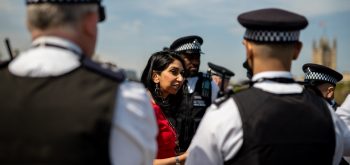The world’s outcry following the televised murder of George Floyd in the United States offered an opportunity for a fundamental reset in the over-policing of black communities. The marches and protests, and demands for change, across the summer of 2020 in the United Kingdom evidenced in some respects that change was possible. We were all united against racism; serving officers in the Metropolitan Police Service even took the knee as a sign of solidarity.
The then prime minister Boris Johnson promised an urgent examination of the state of racism in the UK, culminating in an action plan that took the form of the Commission on Race and Ethnic Disparities (CRED) report, which came to the much-criticised conclusion that institutional racism was ‘not borne out by the evidence’. This plan has to be viewed in the context of new laws that confirm a disturbing trend towards the reduction of civic space and a retreat from principles of equality and non-discrimination. Over the last few months, the government have passed legislation that effectively curtails the right to protest, allows for the arbitrary deprivation of people’s citizenship, and facilitates blatant corruption in public office. The Nationality and Borders Act 2022, the Police, Crime, Sentencing and Courts Act 2022, and the Elections Act 2022, confer extraordinary powers to the state, but not – as far as I can see – carte blanche authority to the police in their apparent campaign against black communities.
Instead, members of the police seem to be demanding this for themselves.
Chris Kaba’s fatal shooting – another incident in the UK’s list of George Floyd moments – has led to the suspension of the officer responsible for the killing from frontline duties, and to yet another IOPC investigation. As a result of the suspension, some officers are reportedly threatening to withdraw their labour. To put it another way: unless they are given the green light to shoot unarmed Black men, and allowed to do so with no accountability, trained firearms officers are threatening to ‘quiet quit’. Such threats discredit the very officers who took the knee two short summers ago, undermine the already flawed CRED report, and signal – if we were ever in doubt – that in sections of the police service, Black Lives do not Matter.
I for one would welcome this threatened exodus of trained firearms officers; it may save a young black man’s life.







